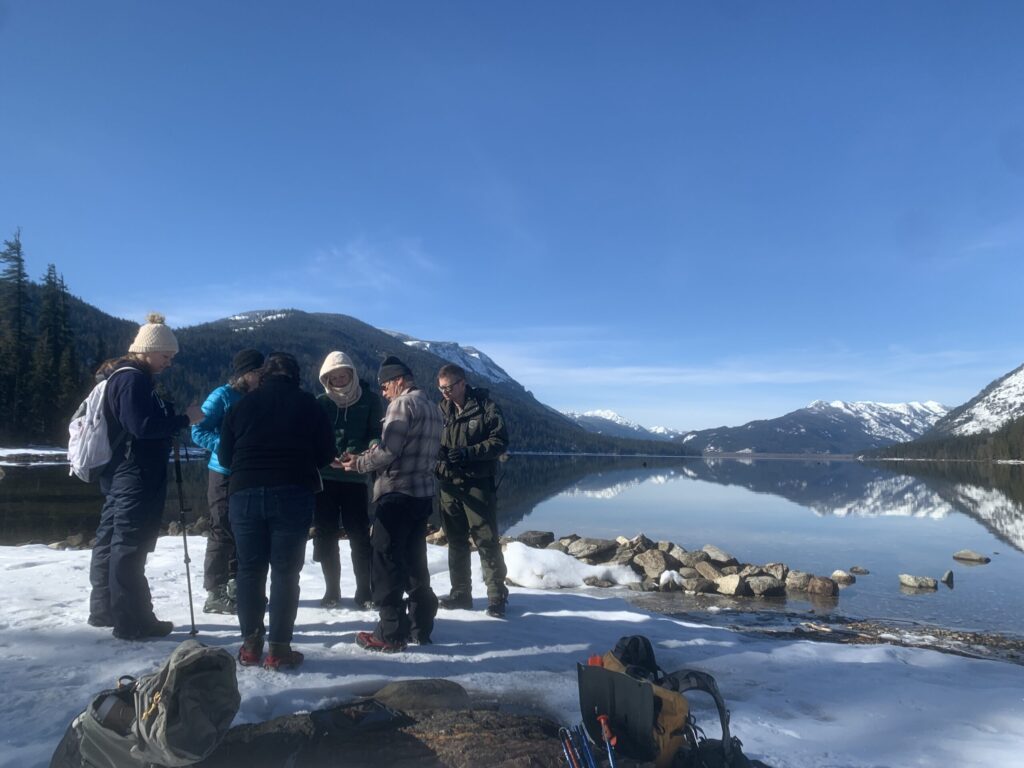For a group of teachers from Eastmont School District, February 11 was a day to remember. At a time when most professional learning workshops for teachers happen indoors, the group spent a day outside – on snowshoes, no less! – analyzing water and snow chemistry as part of a project to integrate watershed education in the classroom. Their day began and ended at Cascade Elementary School but in between, they visited Lake Wenatchee State Park, Peshatin Mill Trail and Lower Sleepy Hollow for a hands-on exploration of watershed systems.

The workshop was part of a two-year project funded through a $149,454 grant from the National Oceanic and Atmospheric Administration (NOAA) Bay Watershed Education and Training (B-WET) program awarded to Cascade Fisheries in 2022. In the first year, PEI is training 5th-grade Eastmont School District teacher-leaders in how to bring local relevance to their existing science curriculum, incorporate relevant watershed-based field experiences for students and work effectively with community partners.
“Starting in the fall of 2023 we’ll recruit the rest of the 5th-grade teaching teams and invite anyone else in the region who wants to attend a training,” says PEI’s Central Washington FieldSTEM Coordinator Megan Rivard.
Cascade Fisheries is working with teachers to set up and maintain salmon tanks in their classrooms while PEI helps them assess their curriculum and identify sections that could be switched out for locally relevant content connected to watersheds. Thus far, those have included units on keystone species and invasive species.
“Cascade Fisheries wanted to get all of the teachers on a snowshoe science watershed watch where they could learn from experts and get hands-on experiences. They made it happen and the teachers loved it. They are really wanting their students to have this experience and are looking for ways that they can tie it into their science kits.”
— Megan Rivard, PEI’s Central Washington FieldSTEM Coordinator
“They have an ecosystem kit where they talk about keystone species,” Rivard explains, “and we are working with one of the teachers to bring

in some articles on tire pollution in streams and how that’s damaging the salmon. We’re also putting more salmon-focused content in the section on invasive species.”
Rivard is also assisting teachers with incorporating the Since Time Immemorial (STI) curriculum in their classrooms to support culturally responsive learning. One of the other units focuses on constellations and the team has been swapping out origin stories from other cultures for indigenous star stories from local Tribes.
The snow day addressed a different part of the BWET grant, Rivard explains. “Cascade Fisheries wanted to get all of the teachers on a snowshoe science watershed watch where they could learn from experts and get hands-on experiences,” she says. “They made it happen and the teachers loved it. They are really wanting their students to have this experience and are looking for ways that they can tie it into their science kits.”
Team Naturaleza’s Wenatchee branch co-facilitated the day for the educators. The organization creates a space where the Hispanic/Latinx community can gather, learn about the environment bilingually, and gain a sense of belonging in the outdoors.
“The district has had great community partners,” says Rivard. “Team Naturaleza and Cascadia Conservation District have been involved from the beginning and have done a lot of the content education for teachers. Jen Herdmann of Cascade Fisheries has been helping with salmon tanks in the schools and working with me on figuring out where everything fits in sequence.”
Next school year the training will be available for more teachers. Wenatchee residents can also expect to see 5th-graders doing science – on snowshoes.
